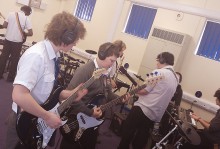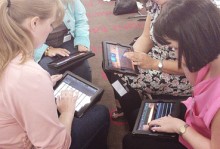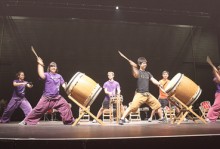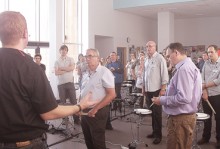This question, at present, seems to be on many peoples minds. As we strive to educate our students, which genre is the most important? Where should we focus our teachings to best embed the learning we desire to impart? The challenge is the question could be answered in many ways with equal merit.
- Classical provides a grounding and in depth knowledge of the routes of all modern music
- Blues shaped the music the majority of us listen to most often
- World music can be felt in many of the most popular genres of music today and gives students a greater understanding of cultures beyond our shores
The list ‘could’ be endless. The length and variety of this list I believe inevitably leads us to the music we as educators feel comfortable with. If we are passionate about a genre of music, and in my experience the genre’s we enjoy will by their nature make us feel passionate about them, we will deliver them to our students in a way which imparts some of that passion. I, for example, was hard wired to enjoy big band and swing as my tutor loved those genre’s. I can talk with excitement and drive about Frank Sinatra, Dean Martin and Buddy Rich. But will focussing my teachings around a style of music I know well give my students the broad curriculum they need?
My music education was immensely fortunate. All my family were musical and I attended a choir school for a large part of my childhood. I had teachers all around me who enjoyed a varied selection of musical genre’s from choral to classical and musical to jazz. One thing stood out in all their teachings, if they were passionate about a genre they were able to make it relevant to ‘my’ education.
No one ever introduced a genre of music and expected me to engage with it, they took the time to explain what we were playing, who composed it and crucially they would marry the technique to a tangible desire I had. It may be mastering a scale from a tune we all aspired to play with a piece of classical of music or showing us the links to the routes of a style of music we enjoyed with blues or jazz, whatever we approached I always understood the reasons why. My music education was relevant to me.
When we consider the situation we find ourselves in now, as educators we should be commended for the quality and breadth of music that is still happening out there. The world has changed so much in the last ten years with the advent of touch screen technology and instant access fixes from a range of media platforms. Keeping a student focused on their learning and their instrument is so much harder than it was when we were students.
From what I see in the schools we work with across the UK and beyond, the key to any musical journey is two fold:
- Initial engagement – after all without that where would any student be?
- Relevance – if we engage our students effectively by keeping our teachings relevant, it doesn’t matter what genre we introduce, our students will follow us wherever we choose to take them
There is a third element which logic dictates can only follow the first two. That element is breadth. One of the most exciting things for me about educating is what musician will walk out of your door after their years in education. If we offer that student the right breadth of curriculum, one day, when you and often they least expect it, you will find ‘their’ best genre. That is my favourite day with any student, its the day they get their wings and begin to fly.
We must ensure we fully engage all our learners in music and its power. I meet countless frustrated musicians old and young who say, ‘I wish I’d had that opportunity when I was at school’. I believe in my heart that if empower all who want to to engage with music, the world would be a very different place.
So how do we fully engage our students? In todays world the quickest and most effective way to do that, I have found, is by embracing relevant technologies. For example, iPads remove barriers to entry for students learning notation and theory, they take us back to a direct connection between composer and their composition as you physically touch your notation. Utilising app’s like Notion transformed my own abilities to engage students in learning to read.
I recall one student who had taught himself the guitar but couldn’t read a note of music and had no intention of starting. He attended a school where we had installed our award winning JamPod™ program and who had recently installed our JamClassHD iPad project. I was there team teaching with the head of music who raised their eyebrows when I mentioned notation to the student in question and understandably! They had worked for two years through Y7 and Y8 trying everything to engage the student in reading the notes they were playing so well. JamClassHD connects iPads in a way which fully empowers their inbuilt sounds but also links them straight to live instruments. The student in question played a tremendous solo on his guitar, I asked him to do the same on the Notion app which he was able to do as he was presented with something he understood, a guitar neck.
It sounded even better than his own guitar, thanks to sounds from the LSO and Abbey Road. Coupled with that sound was a pretty much perfect musical notation of his solo. ‘Did I do that sir?’, ‘What type of note is that?’, ’What other types of notes are there?’. That student now reads music and continued with his studies in higher education.
We live in a unique time where technological innovation is moving so fast, we struggle to keep up with or have time to successfully integrate that technology into the way we learn. As educators we must stop, consider and embrace appropriate technologies and techniques into our pedagogy. The results of this can be profound and by doing so we offer our students the best possible environment to remain engaged with our teachings and thrive.
So what is the best musical genre? In my opinion it is the genre that inspired ‘you’ to pick up and play. After that, it is up to us as educators to deliver a broad curriculum by making those genres we use to deliver that curriculum relevant to our students. Who knows what our students ‘best’ musical genre is, most of the time they don’t even know.
How outstanding it is then that our job, as music educators, is to take our students on a journey through the medium we love. The best part being if we do our job right, at some point on that journey our student will find their ‘best’ genre. Then, we get to witness something wonderful as our students musical wings unfurl and ‘they’ begin to fly. I don’t know about you but those are the best days of my life.
Dan Jones is a former Music Teacher of the Year and designer of the award winning JamPod™ program.








